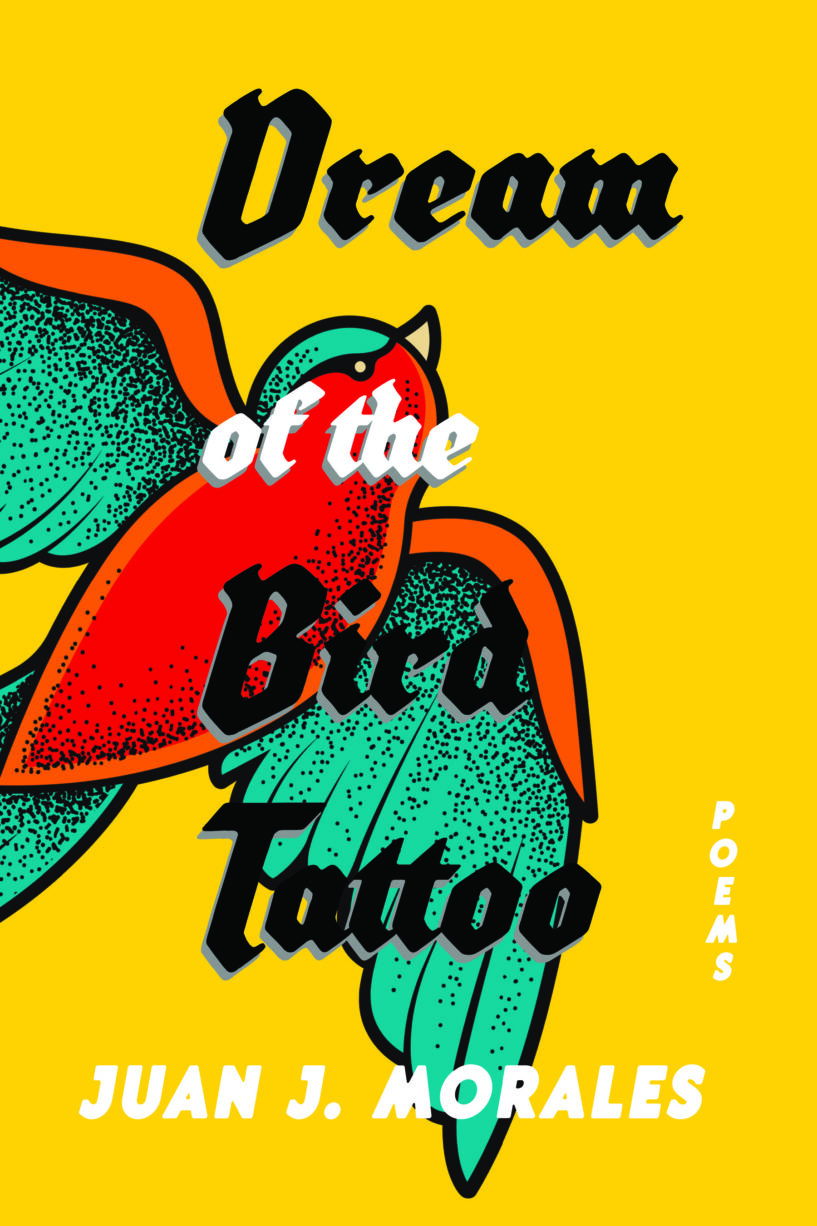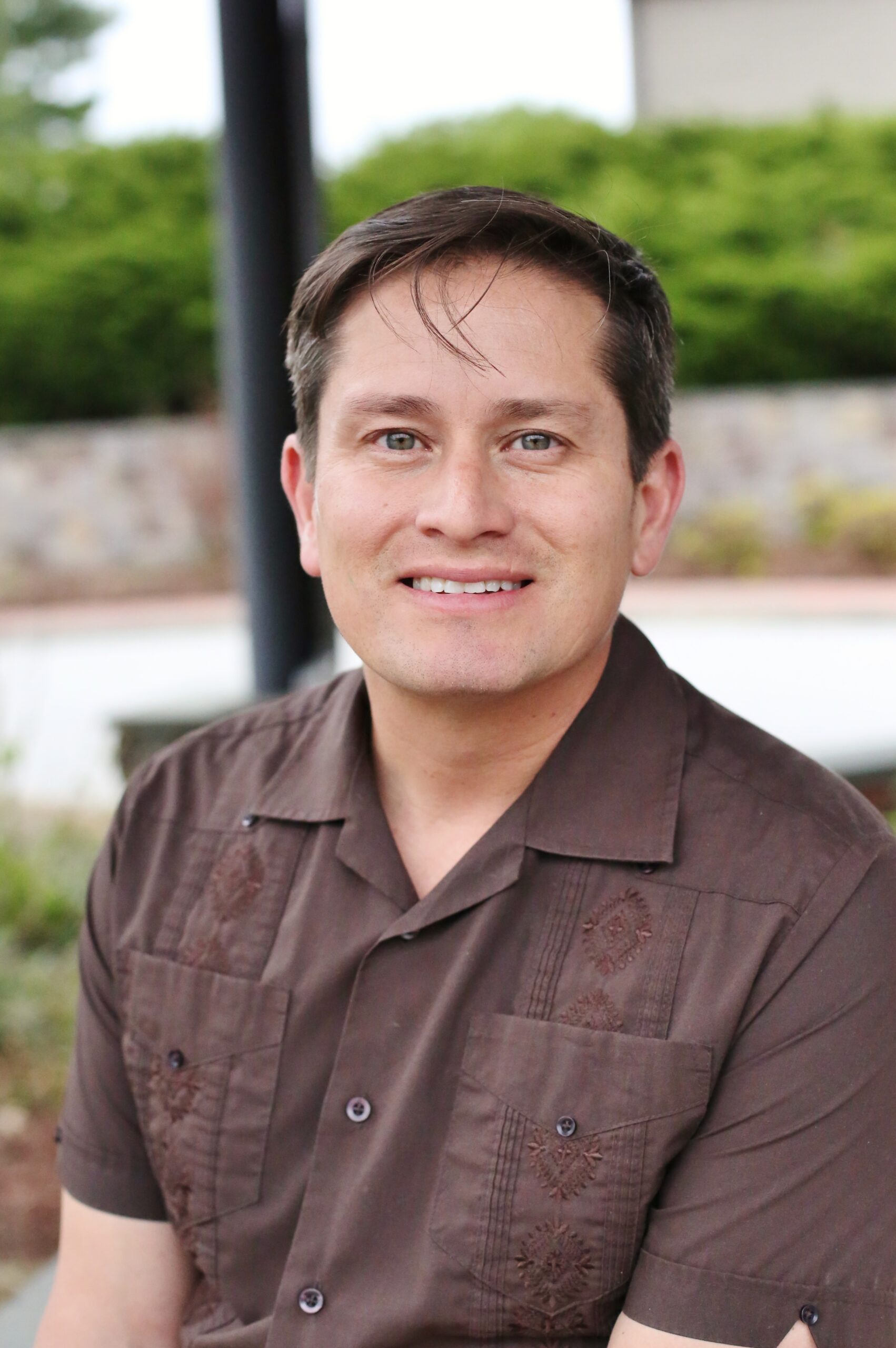
An Interview with Juan J. Morales, author of Dream of the Bird Tattoo
November 14, 2024 | blog, news

Reading Juan Morales’ Dream of a Bird Tattoo, I (Suz Guthmann ’25) am struck by how Morales leads the reader through memory and dream. His rich imagery weaves prose and poetry together, creating a tapestry of grief, affection, and remembrance. Morales’ writing radiates a deep devotion to his family, community, and heritage. While our backgrounds are very different, I find his message of love and connection to be universal, resonating with anyone who has longed to be a child again at their father’s knee, safe and cherished. It was a great honor to interview Juan Morales about his upcoming poetry collection, Dream of a Bird Tattoo.

Guthmann: Did you begin writing Dream of the Bird Tattoo to make sense of the loss of a parent, or did you need time and distance before writing about something so personal?
Morales: My father passed away very suddenly in the beginning of 2019. I had been working on individual poems, but I did not have clear direction. At the same time, I was serving as department chair of English and World Languages at Colorado State University Pueblo, so I struggled to find time to write. There were poems here and there about Puerto Rico, family stories, Colorado, and other unaffiliated poems I didn’t understand yet. After his funeral, I tried to lean into work and avoid grief until I could not. I journaled, drafted, and wrote new poems that worked to tell his story and to reflect on the path through grief. But I wasn’t consciously doing it. I also kept filling my journal with dream transcriptions that I composed half asleep to avoid losing them in the waking world. Their beautiful strangeness reminded me of Charles Simic’s poetry that a mentor introduced me to early on in my writing life. I wrote poems in bursts and then had to take big durations of time where I didn’t write at all. The book felt complete around the beginning of 2023 when I finally revised the grief poems and assembled them with recent and older dream poems, some of them being 20 years old. It was challenging to get so personal with this book, which is why I had to give myself breaks to process, reflect, and talk it through with supportive friends and family members. I couldn’t have done it without my partner and my support system, who encouraged me to write and helped me find time to do so.
Guthmann: The imagery throughout your collection is stunning. You intertwine the landscape of Puerto Rico with the sterile ICU, the rigidity of a military funeral with the fluidity and humor of family memories, Catholicism with traditional folklore monsters. Do you begin writing with an image in mind, or do you start with a more abstract idea?
Morales: My poetry has always originated in the desire to tell a story, and I love how poetry challenges us to be musically concise in the process. Whenever I tell stories, I overwhelm myself with all the details I want to share, so poetry gives me the structure to pare it back and ground it. Most of my poems begin with me journaling an encounter, an event I witnessed, a story I heard, or times I try to reenact a memory on the page. This includes the poems about my father’s hospitalization, his funeral, and the trips afterward to get away and face from my emotions.
Also, I have always been drawn to ghost stories and the paranormal, so a lot of my writing borrows ideas and structures from the way we tell each other spooky stories, which is a tough balance of exposition and creepy walkthroughs that pay off with the scares. Similar to that, transcribing dreams also continues to help because it’s more effective to focus on the imagery and sensory details instead of explaining the dream’s message. Sometimes, it’s about preserving your palpable feelings immediately upon waking before they get lost. The same urgency occurred with poems where I had to make sure we could still hear Dad’s voice.
Guthmann: Some of my favorite moments in the book are in the “Shit My Puerto Rican Father Said,” and “Dream” poems. How did you decide where to place these within the collection?
Morales: I figured out quickly that I could not rely on a chronological approach. Just like every collection I’ve written, I printed out the poems and spread them out on the ground. I stacked the poems together when I found throughlines and related images and actions. Assembling the book, I discovered that not all but most of the dream poems were prose poems. I decided to embrace this approach to guide the reader through the book. The poems grounded in reality are verse, and the dreams stayed in prose. This decision also helped me revise the dream poems away from messaging and context. This is when I started calling them, sueñitos, or little dreams. I wanted the sueñitos to become opportunities to lean into negative capability and the fantastic. They also are forms of escape from sobering reality and offer more time to reflect.
Meanwhile, “Excerpts from Shit My Puerto Rican Father Said” started out as a single poem with section breaks. After I had most of the book ordered, I noticed the humorous moments were few and far in between. The book needed balance and laughter because that’s who my dad was. Spreading out these excepts allowed the reader to hear my father’s voice directly while also giving them a reprieve from the darkness. They stayed as prose poems because they are structured very much like snapshots from the past.
Guthmann: Writing from your own experiences, how do you balance the desire to tell everything exactly as it was while bending the details creatively?
Morales: When I was working on my first book, Friday and the Year That Followed, I wrote a war poem, based on a story that my dad told me in a vulnerable moment. I did my best to imagine myself in the Vietnamese landscape and the sequence of violent events that occurred and went on to haunt my father since he was in command of the unit. I remember watching him read the poem and I was anxious for him to praise me and the poem. He paused and then said, “This isn’t how it happened.” Before I could be completely devastated, my dad finished his thought, “But don’t change a damn thing about it.” My takeaway was that the poem was working in the truth of the moment. Just like creative nonfiction, poetry can bend time and reality in surprising ways. I do my best to stay as accurate and truthful as possible to the memories and stories I’m retelling, but I also have learned to forgive myself when the fog of memory and my perspective does not render the experience with complete accuracy. Details can vanish and it works well to also embrace what we don’t know. This also goes with tough sacrifices based on compression, restraint, sensory details, and all the devices we use to preserve our poetry as emotions and snapshots. Also, I always try to embrace discomfort while writing, knowing full well there are times where I need to cut back for my emotional well-being.
Guthmann: What do you believe is the role and responsibility of the poet?
Morales: I found my way to poetry via storytelling and with the strong desire to preserve family, home, and environment before we lose them. It also overlapped with my regular education in poetry of witness, which still resonates with me today. The poet Wayne Miller introduced me to the concept of literary citizenship when he was visiting one of my classes several years ago, and I took up that cause too. It influences how I try to be not only be an active and supportive with my fellow writers, but it also ties me to how I can best support my communities. This includes the need to be politically active, vote, supportive of community causes, and giving voice to the unvoiced. The poet’s responsibility must be decided by the poet, but on the page and in their lives, it should be for the sake of community, love, and support. Go to the reading and support the writer. Use the library and check out banned books. Attend city council and school board meetings. Inspire each other with the poems you write. Buy books by local authors and small presses at the local bookstore. Write to connect and remind each other that we are not alone.
Guthmann: What are some of your favorite works of poetry that don’t get enough attention?
Morales: There are countless poetry collections out there that don’t get enough attention. To help narrow this down, here are a few poetry collections that I revisit frequently and that had a lasting impact on Dream of the Bird Tattoo: Jimmy and Rita by Kim Addonizio, Blood Run by Allison Adelle Hedge Coke, City of Coughing and Dead Radiators by Martín Espada, Unpeopled Eden by Rigoberto González, The Book of What Remains by Benjamin Alire Sáenz, Abide by Jake Adam York, and Dear Darkness by Kevin Young. These books helped teach me how to write about grief, sense of place, storytelling, family, and different ways things can haunt us. They also surprised me in several moments where I found permission to write in my own voice and take new risks in my writing.
Guthmann: Your collection is deeply personal, but it invites the reader to experience the joy of having loved someone who’s now gone. What advice would you give to a poet who wants the personal experiences they’re writing about to resonate with their readers?
Morales: A lot of my poems start with observations of small details and gestures, and then the drafting and revision process helps me uncover the larger connections to the world. Stay determined in your writing endeavors and give yourself credit when you write a little bit. Celebrate when you create something that surprises yourself. Forgive yourself when you are not writing enough or when you don’t feel like you’re on the same pace with other writers you know or see on social media. If you do need a nudge, find a writer friend to be your accountability buddy or create due dates that can help you finish the project. If you are specifically writing about family or loved ones, be honest, lean into discomfort, and be mindful of any lines you do not wish to cross. If you’re not sure, talk it out with someone you trust. Finally, even if you are writing in response to difficult experiences, try to write through the anger and sadness instead of about them.

Juan J. Morales grew up in Colorado, the son of an Ecuadorian mother and a Puerto Rican father. He is the author of four poetry collections, including The Handyman’s Guide to End Times and his latest, Dream of the Bird Tattoo, published University of New Mexico Press. Recent poems have appeared in The Laurel Review, Breakbeats Vol. 4 LatiNEXT, Acentos Review, terrain.org, South Dakota Review, Sugar House Review, and Poetry. Morales has received fellowships from CantoMundo, Macondo, Longleaf Writers Conference, and he has served as the editor/publisher of Pilgrimage Press. He lives in Pueblo, Colorado and is now an Assistant Professor of English at Colorado College.
